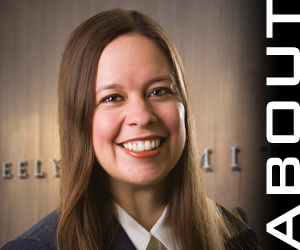Ethics Engaged | Summer 2017
Moral Machines
The ethics of artificial intelligence.

Elizabeth Pittelkow Kittner
CFO and Managing Director, Leelyn Smith LLC
Exploring Ethics in Business & Finance Today
KPMG is using McLaren Applied Technologies
(MAT) and Watson Analytics, and
Deloitte is using Kira Systems for document
review and data analytics. EY is creating
its own artificial intelligence (AI)
center in India with the goal of helping
clients integrate technology more into
their business processes. PwC recently
issued “Bot.Me: A Revolutionary Partnership,”
an in-depth report on how AI is
pushing humans and machines closer
together, and what impact this relationship
will have on our future—like the likelihood
of AI assistants replacing humans for
tax preparation and financial advisory
services.
In other words, automation tools and AI
are catching the eyes of some of the
biggest players in the accounting and
finance worlds, which means we would
all be wise to take notice, especially when
McKinsey & Company’s “Where Machines
Could Replace Humans—and Where
They Can’t Yet” estimates 86% of the work
done by bookkeepers, accountants, and
auditing clerks could potentially be automated.
In “Improving Experienced Auditors’
Detection of Deception in CEO Narratives,”
University of Illinois at Urbana-
Champaign and Duke University
researchers found that experienced human
auditors (71 percent accurate) are currently
performing similarly to machines (69 percent
accurate) for fraud-detection, but we
may be overtaken soon. However, while
humans and machines both now have the
ability to learn, humans may also experience
more objectivity issues that prevent
them from detecting fraud, like maintaining
long-term relationships with clients and
fearing the implications of being wrong.
What impact will our increasing interaction
with advanced technologies have on
our ethics, and what implications does
technology have on our professional interactions?
We have been (mostly) comfortable with
our computers up to this point because we
trust the developers to ensure the hardware
and software we use does what they
say it will. Thanks to these hardware and
software products, our accounting is more
efficient. Clients can use financial statement
and tax preparation software in their
businesses to help automate some of our
work, and we can spend more time on
value-add activities, evaluating data, making
decisions, and recommending strategies.
Time for non-traditional accounting
activities has even fueled the trend of
CFOs building the skills needed to move
from CFO to CEO, like at PepsiCo, Crate &
Barrel, Siemens, and Hartford Financial, to
name a few.
The technology tools of our future, however,
will not only process data, but also
make decisions on the data. As machines
develop more cognitive and decision-making
skills, we must concern ourselves
with how AI acts toward humans, which
forms the concept of machine ethics or
moral machines.
According to James H. Moor, Daniel P.
Stone Professor in Intellectual and Moral
Philosophy at Dartmouth College, we are
already facing four types of machines
when it comes to ethical influences:
Ethical Impact Agents are machines that
carry an impact whether intended or
not; for example, a clock may influence
us to be on time, which may or may not
be the intent of the clock. Implicit Ethical Agents are machines
designed to avoid unethical and negative
outcomes; usually they are built for
security or safety, like your car alerting
you when the fuel is low.
Explicit Ethical Agents are machines
programmed with algorithms to act ethically,
like a drone programmed to
destroy an empty military vehicle while
avoiding nearby humans.
Full Ethical Agents are machines that
have free will, thinking ability, and consciousness
to make independent ethical
decisions like humans. In other words,
the machine makes moral decisions and
can understand why it makes these
decisions.
Decades ago, professor and acclaimed science-
fiction writer Isaac Asimov presented
his Three Laws of Robotics as an idea for a
machine moral code:
1. A robot may not injure a human being
or, through inaction, allow a human
being to come to harm
2. A robot must obey the orders given it
by human beings except where such
orders would conflict with the First Law
3. A robot must protect its own existence
as long as protection does not conflict
with the First or Second Laws
However, Asimov tested his own laws and
found them unsuitable for an effective AI
moral code because there is not a set of
fixed laws that can anticipate all possible
situations.
A second idea for a moral code that has
tested closer to effectiveness (still not perfect)
is Kant’s Categorical Imperative,
which says, “Act only according to that
maxim whereby you can, at the same time,
will that it should become a universal law.”
A third idea is for machines to learn casuistry
and ethics through observing human
interactions on the internet, but some have
already demonstrated negative human
behaviors like biases and discrimination.
An idea for AI used in accounting is to program
our profession’s Code of Professional
Conduct into the machines. How would
we need to modify it for interactions that
involve AI?
Much debate has already gone into determining
if machines can have a common
ethical code, and much more debate is
still to come. If you want to weigh in on
the debate, MIT has launched the Moral
Machine, a web platform for gathering
human perspectives on moral decisions
made by today’s machine intelligence.
As humans, we do not always make perfect
ethical decisions. Can we expect machines
to live up to an impossible standard?